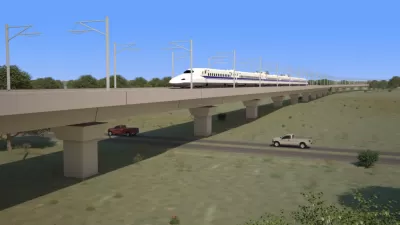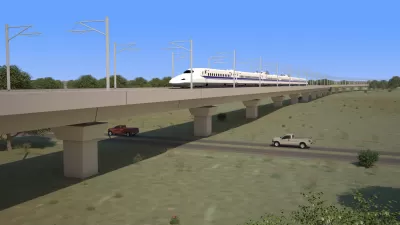A report commissioned by Texas Central Partners is the first to calculate the potential economic benefit of a proposed privately developed high-speed rail connection between Houston and Dallas.

Brandon Formby reports on the results of a study by Texas Central Partners about the potential economic benefit of a high-speed rail connection between Dallas and Houston. According to the study, as reported by Formby, "the project will spur $36 billion in economic benefits over 25 years – and will pour hundreds of millions of dollars into government coffers each year."
The private development of the project will bring unique benefits to public revenues. "Because Texas Central is a private company, its property and infrastructure is taxable, unlike tax-funded rail lines or highways. That means the company will have to pay property taxes to cities, school districts and counties for the entire length of its track between the two metropolitan areas. Those rural counties between the two cities is home to several people who oppose the project," explains Formby. In all, the report expects Texas Central to pay $2.5 billion in taxes by 2040.
The article also includes soundbites offered by Kyle Workman, president of Texans Against High-Speed Rail. Workman says the study overlooks the loss of property value on land taken along the route.
The article also includes more about forthcoming decisions about station locations.
Texas Central Partners hired Insight Research Group, based in Allen, Texas, to complete the study.
FULL STORY: Study: High-speed rail would spur billions in economic benefits

Planetizen Federal Action Tracker
A weekly monitor of how Trump’s orders and actions are impacting planners and planning in America.

Congressman Proposes Bill to Rename DC Metro “Trump Train”
The Make Autorail Great Again Act would withhold federal funding to the system until the Washington Metropolitan Area Transit Authority (WMATA), rebrands as the Washington Metropolitan Authority for Greater Access (WMAGA).

The Simple Legislative Tool Transforming Vacant Downtowns
In California, Michigan and Georgia, an easy win is bringing dollars — and delight — back to city centers.

The States Losing Rural Delivery Rooms at an Alarming Pace
In some states, as few as 9% of rural hospitals still deliver babies. As a result, rising pre-term births, no adequate pre-term care and "harrowing" close calls are a growing reality.

The Small South Asian Republic Going all in on EVs
Thanks to one simple policy change less than five years ago, 65% of new cars in this Himalayan country are now electric.

DC Backpedals on Bike Lane Protection, Swaps Barriers for Paint
Citing aesthetic concerns, the city is removing the concrete barriers and flexposts that once separated Arizona Avenue cyclists from motor vehicles.
Urban Design for Planners 1: Software Tools
This six-course series explores essential urban design concepts using open source software and equips planners with the tools they need to participate fully in the urban design process.
Planning for Universal Design
Learn the tools for implementing Universal Design in planning regulations.
Smith Gee Studio
City of Charlotte
City of Camden Redevelopment Agency
City of Astoria
Transportation Research & Education Center (TREC) at Portland State University
US High Speed Rail Association
City of Camden Redevelopment Agency
Municipality of Princeton (NJ)





























